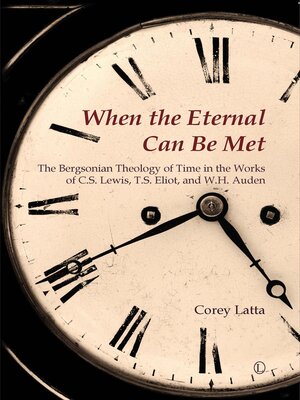When the Eternal Can Be Met
ebook ∣ The Bergsonian Theology of Time in the Works of C.S. Lewis, T.S. Eliot and W.H. Auden
By Corey Latta

Sign up to save your library
With an OverDrive account, you can save your favorite libraries for at-a-glance information about availability. Find out more about OverDrive accounts.
Find this title in Libby, the library reading app by OverDrive.



Search for a digital library with this title
Title found at these libraries:
| Library Name | Distance |
|---|---|
| Loading... |
When the Eternal Can Be Met excavates the philosophy behind the theology of the twentieth century's most prominent Christian writers: C.S. Lewis, T.S. Eliot, and W.H. Auden. These three literary giants converted to Christianity within little more than a decade of one another, and interestingly, all three theological authors turned to the theme of time. All three authors also came to remarkably similar conclusions about time, positing that the temporal present moment allowed one to meet the eternal. The prominent philosopher Henri Bergson wrote about time's power to transform an individual's emotional and spiritual state decades before Lewis, Eliot, and Auden sought to creatively construct a fictive or poetic theology of time. When the Eternal Can Be Met argues that one cannot fully understand Lewis, Eliot, and Auden's theology of time without understanding Bergson's theories. From the secular philosophy of Bergson dawned the most important works of literary theology and treatments of time of the twentieth century, and in the Bergson-influenced literary constructs of Lewis, Eliot, and Auden, a common theological articulation sounds out - time present is where humans meet God.







